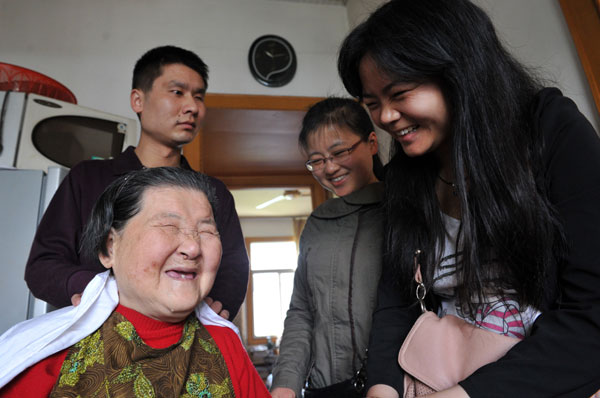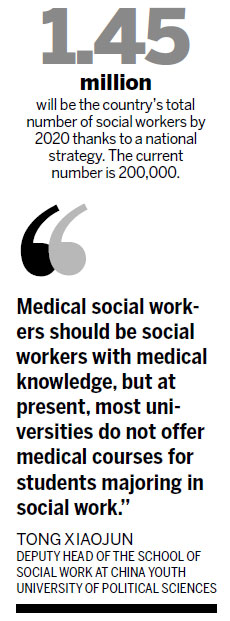Social workers to get boost
Updated: 2012-06-12 07:32
By He Dan (China Daily)
|
||||||||
Trained professionals can function as bridge between patients and hospital
After a series of shocking attacks on medical staff, including some that resulted in serious injuries and death, Beijing health authorities are boosting the number of social workers in an effort to ease the tension.
The capital aims to have a social services department manned by trained professionals in every hospital by 2015.
Health authorities anticipate that the new recruits - who will be hired as part of a national strategy to take the country's total number of social workers from the current 200,000 to 1.45 million by 2020 - will aid communication between hospitals and patients.
|
 |
| Social workers chat with an elderly woman while a volunteer masseur gives her a free shoulder massage at the Hupo community in Hefei, Anhui province. With the help from four full-time social workers and more than 100 volunteers, the community has been offering home-based care services for its elderly residents for three years. Guo Chen / Xinhua |
But will it work? Analysts have welcomed the move, but most expect that the authorities will face many challenges.
Local media reports show that only two hospitals have social workers on staff in Beijing: Peking University People's Hospital and Peking Union Medical College Hospital.
|
 |
Hao Xujie, who manages the service at Peking University People's Hospital, said the hospital started providing social work services in 2009 after hospital leaders traveled abroad and witnessed the effect the services had in hospitals in developed countries.
"The idea of establishing a medical social work department soon became a reality. The Ministry of Health approved it and allocated funds to our hospital," he said.
Hao declined to say how much financial support the hospital receives from health authorities.
Hao's department has just two permanent staff members, and their main task is to enlist and train volunteers, rather than provide services to patients.
"Our hospital has nearly 1,700 beds and the daily outpatient number is about 9,000 on average, so the two of us can never handle so many patients without the help of volunteers," he said.
With about 2,200 volunteers, his office provides counseling for patients suffering from kidney disease who regularly come to the hospital for dialysis, among other services.
Although social workers can act as a bridge between patients and medical workers, few hospitals are enthusiastic about investing in recruiting.
"Social service doesn't generate any profit for hospitals, while the positive changes it brings can't be measured in a short time, as there is no solid statistics to show patients' complaints have decreased dramatically," he said.
Beijing Municipal Bureau of Civil Affairs declined an interview request from China Daily on Monday, saying it was too early to comment on the official plan to extend medical social work services.
"It's urgent to have social workers (at hospitals) because many conflicts among patients and medical staff are due to communication problems," said Cui Lanxin, secretary-general of Beijing Chunmiao Save the Children Foundation.
"Doctors are always too busy to answer all the questions from patients and their families, which often makes patients feel that their concerns are not treated seriously or even ignored."
However, to ensure social workers stay neutral between patients and hospitals, Cui said they should be employed by governments.
"If the social workers are employees of hospitals, then some patients will think that their work is to protect the hospitals' interests, not theirs."
Meanwhile, Tong Xiaojun, deputy head of the School of Social Work at China Youth University for Political Sciences, urged colleges to reform their teaching content to provide more qualified medical social workers.
"Medical social workers should be social workers with medical knowledge, but at present, most universities do not offer medical courses for students majoring in social work. Therefore, hospitals need to train these students again before letting them perform duties independently," she said.
The Ministry of Civil Affairs said there are 250 universities on the Chinese mainland providing bachelor's degrees in social work and 60 graduate schools teaching social work programs, and these institutions each year graduate about 15,000 social workers.
Tong also stressed that the government should work hard to facilitate medical social workers to connect patients with social resources in the future.
"The supportive policies for social workers have yet to be established. It's almost impossible for a medical social worker in China to check the financial support or medical insurance situation for a patient diagnosed with a fatal disease. Therefore, their intervention is limited," she said.
How to attract more university graduates to devote their lives to a career in social work is another problem the authorities should think about, said Sun Yiran, 22, a junior student majoring in social work at China Women's University in Beijing.
"I really love the job of social work, but as far as I know, the starting basic salary for a social worker in big cities such as Beijing and Shanghai is about 2,000 yuan ($310)," Sun said. "How can you survive with such little payment?"
A Beijing municipal government policy allows university graduates who sign a three-year work contract with local communities to receive a hukou (a permanent residency permit) in Beijing.
"This is a lure for many students, however, some people treat it as a rebound job. Once they get hukou, they will quit and look for jobs with higher payment," Sun said.
Contact the writer at hedan@chinadaily.com.cn

 Relief reaches isolated village
Relief reaches isolated village
 Rainfall poses new threats to quake-hit region
Rainfall poses new threats to quake-hit region
 Funerals begin for Boston bombing victims
Funerals begin for Boston bombing victims
 Quake takeaway from China's Air Force
Quake takeaway from China's Air Force
 Obama celebrates young inventors at science fair
Obama celebrates young inventors at science fair
 Earth Day marked around the world
Earth Day marked around the world
 Volunteer team helping students find sense of normalcy
Volunteer team helping students find sense of normalcy
 Ethnic groups quick to join rescue efforts
Ethnic groups quick to join rescue efforts
Most Viewed
Editor's Picks

|

|

|

|

|

|
Today's Top News
Health new priority for quake zone
Xi meets US top military officer
Japan's boats driven out of Diaoyu
China mulls online shopping legislation
Bird flu death toll rises to 22
Putin appoints new ambassador to China
Japanese ships blocked from Diaoyu Islands
Inspired by Guan, more Chinese pick up golf
US Weekly

|

|







